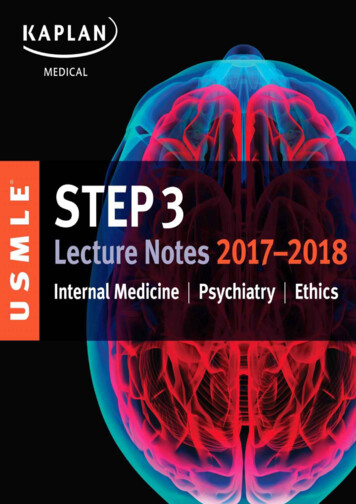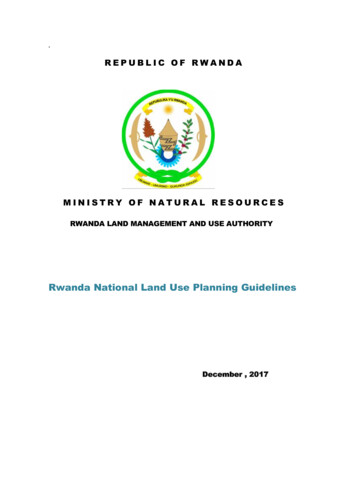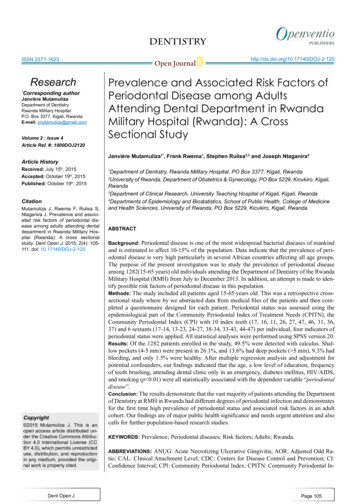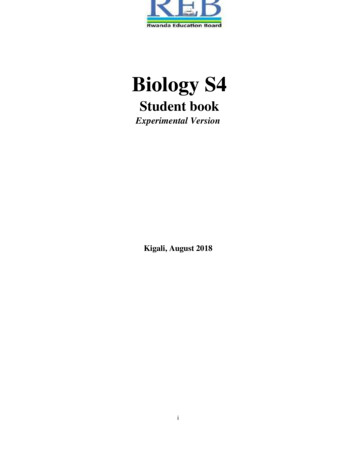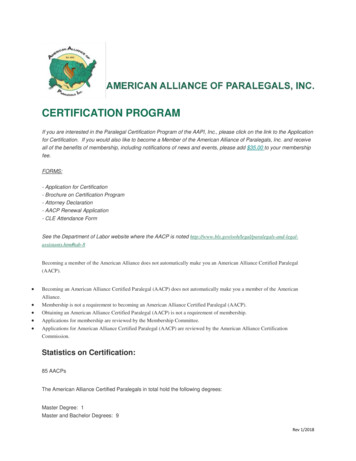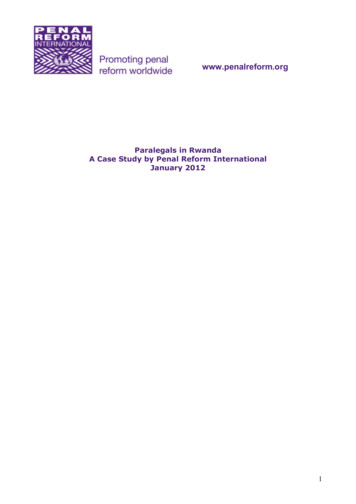
Transcription
www.penalreform.orgParalegals in RwandaA Case Study by Penal Reform InternationalJanuary 20121
About this publicationParalegals are becoming an increasingly important part of the criminal justicesystem in developing countries. By ensuring more people are aware of theirrights within the prison system and can therefore represent themselves andfollow up on their cases, paralegals contribute towards a reduction in numbersin pre-trial detention. PRI’s Great Lakes office ran paralegal programmes inboth Rwanda and Burundi, although this leaflet focuses specifically on PRI’sexperience of designing and delivering paralegal programmes in Rwanda. Italso presents the lessons learned. While there is a huge range of paralegalservices, the one that PRI used in Rwanda is a model for providing legal aid,which has been tried and tested in a number of different countries and shownto be effective1.What is Penal Reform International?Penal Reform International (PRI) is an international, non-governmentalorganisation founded in 1989, committed to reducing the use of imprisonmentaround the world, through promoting alternatives to imprisonment, and todeveloping and promoting the implementation of international human rightsstandards on criminal justice and prison conditions.What are paralegals?Paralegals provide legal aid to people in a number of different ways, frominforming them about the law and court procedures to advice and assistancewith legal problems. They have basic knowledge of the law, legal system andprocedures, as well as basic legal skills, but are not necessarily qualifiedlawyers.2 The paralegals employed by PRI had law degrees as a minimumrequirement.Why not use a lawyer?In many countries around the world, there are too few lawyers to allowspecialism in any one area, including criminal law; they also tend to be citybased and too expensive for most people to use. Publicly-funded legal aidsystems, if they exist, tend to have limited human and financial resources. Atthe same time, many people do not require expert legal opinion or formalrepresentation. A trained paralegal can assist with most legal conflicts whicharise in people’s lives. More complex matters can then be referred to the legalprofession.Is ‘paralegalism’ something new?No. Paralegals have been around for a long time, although they are sometimesreferred to in different ways. In some countries, they have long been respectedand trusted members of the community, offering advice and assistance on a1PRI supported the development of the Paralegal Advisory Service (PAS) in Malawi as a model for legal aid in criminalmatters. Between 2000 and 2003, the initiative grew to 28 paralegals working in 13 prisons, facilitating the release ofover 1350 prisoners. For more information, see PRI’s film, Path to Justice, which charts the experience of paralegals inMalawi: , and PRI’s publication Energising the criminal justicesystem in Malawi: A paralegal aid service, 2002 g-criminaljustice-system-malawi-0) on which some of this document is based.2Open Society Justice Initiative, Community-based Paralegals: A Practitioner’s Guide (Open Society Institute, NewYork, 2010), page 162
range of issues, including inheritance, land and family matters. In more recenttimes, paralegals have demonstrated that they also have an important role toplay in providing basic services to those who are in conflict or in contact withthe criminal justice system.Do these paralegals actually represent people?No. Normally, paralegals do not represent people in court (this would normallybe done by a lawyer) nor charge a fee for their services. Paralegals provideeducation, information and assistance free of charge so that those caught up inthe criminal justice system do not feel lost and are better able to navigate thecomplex procedures and exercise their legal rights. Rather than compete withcriminal justice agencies or the legal profession, paralegals providecomplementary services.PRI’s PARALEGAL PROGRAMME IN RWANDAPenal Reform International’s work from 1998 to 2010 in the Great Lakes regionof Africa aimed to reduce the pre-trial prison population. The organisationmonitored the process of Gacaca - the name given to the system ofcommunity-based courts for prosecuting genocide suspects - and its workexpanded to include providing paralegal services. In July 2009, with supportfrom the European Commission and the Belgian government, PRI launched apilot project to develop paralegal services for detainees held in prisons inRwanda, with the objectives of contributing to a reduction in the high rates ofpre-trial detention, improving access to justice and supporting the right ofdetainees to a fair trial. The paralegals also worked with the prison andprosecution services to introduce better case management systems, in order toimprove general procedures. PRI complemented this work, building thecapacity of prison staff by running workshops on human rights and recordmanagement and installing new database software. Emphasis was placed onreaching vulnerable detainees including minors, women and those affected byHIV/AIDS.What was the role of the paralegals? Support the prison administrative services in the management of theprisoners’ files;Offer immediate legal assistance, including legal information provisionthrough awareness-raising sessions, to detainees awaiting trial;Liaise with the prison administration, the police, prosecution service, thejudiciary, lawyers and any other agencies dealing with the court case;andWork to improve co-ordination and communication among the variouscriminal justice professionals.The paralegals also linked the detainees and the criminal justice system so thatcase files were completed and kept up-to-date, and people held in prisonawaiting trial were given information on how to prepare their cases for trialand represent themselves.3
The paralegal programmes in both countries brought clear results (see page6), as several cases were brought to trial or conclusion more rapidly anddetainees were able to obtain dates for provisional or permanent release.Ten paralegals provided services in five prisons in Rwanda (Kigali, Gitarama,Butare, Cyangugu and Nyagatare), organising and conducting education andawareness-raising sessions for detainees – particularly children, women andprisoners with HIV/Aids. They also assisted the authorities in managingprisoners’ files to ensure that cases could proceed more swiftly, withappropriate evidence prepared for trial, and that prisoners were not detainedlonger than the legal limit.What were the paralegals’ objectives?Through the continued presence of paralegals, PRI aspired to: inform detainees of their rights, so that they were better equipped tomonitor their own case and represent themselves in court;contribute to capacity-building of prison staff for monitoring records andof other agents in the criminal justice and prison system; andcontribute to a significant reduction in illegal detention on remand andthus contribute to a reduction in the prison population.How were the paralegals trained?PRI designed and delivered specialised training sessions for the paralegals,which included modules on: International human rights instruments;National criminal law and procedure (including the Constitution and thePenal Code);The judiciary and the court systems;Prison conditions, systems and infrastructure;Health and safety awareness;Information management, including an introduction to PRIson Watchcase management computer software (specially commissioned by PRI forthe programme in Rwanda);The role of the paralegal within the prison;Understanding the Code of Conduct (see Annex 1);Interview skills;Group facilitation techniques and education skills; andRights of vulnerable groups such as women and children.During their intensive training, the paralegals also went on a visit to a prison, apolice station and public prosecutor’s office.4
What did the paralegals’ activities achieve?1) Legal literacy: helping prisoners understand the lawThe paralegals organised and conducted awareness sessions for over 3,000detainees awaiting trial (in particular for vulnerable groups of prisoners,including women, children and detainees living with HIV/AIDS) during whichthey addressed the rights of detainees and other legal topics. The sessionscovered modules such as arrest, pre-trial detention, and trial procedures.Emphasis was placed on preparing detainees to help and represent themselvesby role-playing applications for release, cross-examination and pleas inmitigation.PRI distributed 7,300 booklets on the rights of detainees in all Rwandanprisons, as well as 500 posters on life in prison and the legal process fromarrest to imprisonment.Much of the paralegal training in Rwanda was based on content PRI hadalready developed in its trainer’s manual3 for paralegals working in prisons inMalawi, as part of their work there from 2000 to 2007. The manual was usedextensively and is still available from PRI.2) Legal advice and assistance: enabling prisoners to apply the lawThe paralegals worked with prison officers to screen and filter prisoners so thatthose who had been lost in the system, or were in prison unlawfully orinappropriately, were brought to the attention of the authorities. They ensuredthat vulnerable groups were given priority.The paralegals also compiled case lists and referred the individual cases to thecourts. They followed up each individual case4 until the person was released,convicted or sentenced. They assisted prisoners with completing standardisedprocedural forms agreed with the judiciary, which the paralegals then lodgedwith the appropriate court.3) Linking the criminal justice system: improving communication, cooperation and coordinationIn Rwanda, paralegals provided one link in the chain that constituted thecriminal justice system. They sought to promote communication, co-operationand coordination between the various criminal justice actors through: Partnership and collaborationThe paralegals were employed by PRI, which, whilst an independent,international NGO, was experienced in working in cooperation with the prisons,the police and the courts. While inside the prisons, the paralegals workedunder the authority of the prison service and were subject to their internalregulations, but also obliged to comply with a code of conduct designed by PRI3Paralegal Aid Clinics: A Handbook for Paralegals Working in Prison, Penal Reform International, alegal-handbook-en.pdf)4See Annex 2 for a copy of the follow-up form used by the paralegals to keep track of cases.5
(see Annex 1). They did not seek to accuse anyone of wrongdoing, but ratherto assist criminal justice actors who were often overstretched and underresourced, and struggling to fulfil their legal obligations. For example, theparalegals sought to support prison staff to increase their capacity to bettermanage inmate files. TrustThe basis of the working relationship, with both the prisoner and theauthorities, was one of trust. The paralegals sought to find practical solutionsto any problems encountered, through dialogue. They provided prison directorswith copies of their monthly reports and their schedule of visits to the court, aswell as a list of detainees interviewed and the areas of education planned.RESULTSAnalysis of prisoner numbers in RwandaIn 1994, approximately one million Rwandan citizens were killed during thegenocide.5 Initially, around 130,000 people were accused of organising ortaking part in the genocide, and were detained in prisons designed for only18,000 prisoners. Prison overcrowding and poor conditions were therefore ahuge problem for Rwanda and in 2001 there were still 125,000 people in prisonawaiting trial6. By the end of 2010 the official prison population had decreasedsomewhat, to 43,400, but this still constituted a high occupancy rate of 150%.The International Centre for Prison Studies7 shows an overall reduction inprisoner numbers in Rwanda in the first decade of the 21st century, but it isdifficult to draw from this concrete evidence of what the paralegals achieved.The statistics below seek to elaborate in more detail.Paralegal activity: a year in numbersBetween October 2009 and October 2010, the following results were obtainedin Rwanda, in part due to the paralegals’ assistance: the permanent release of 625 detainees was facilitated throughdischarge, case dismissal or release on compassionate grounds;provisional release was obtained for 168 detainees;369 detainees were able to enter a guilty plea;court summons were issued for 1,055 people;copies of 1,100 judgments were obtained so that the prisoner couldunderstand his/her position; and455 appeals were lodged.The table (Figure 1) below illustrates the impact of the paralegal programmeon a month-by-month basis. As it and the graph (Figure 2) beneath it show,there were definite increases in the numbers of people released in October5Rwandan government figures, quoted in Penal Reform International, Eight Years On A Record of Gacaca Monitoringin Rwanda, 2010, p13 rs-ona-record-gacaca-monitoring-rwanda)6Penal Reform International, Gacaca Jurisdictions and their Preparations, January -preparations-0)7Statistics from International Centre for Prison Studies (www.prisonstudies.org), accessed 16 August 20116
2010 compared with October 2009, as well as those who had received a courtsummons; any movement in a case that had otherwise been stagnant wasseen to be a positive step, and helped towards the overall aim of reducing theprison population.Figure 1 – Results in prisoner cases October 2009 – October ivedcourtsummonsObtainedcopy 5Figure 2 – Patterns of results obtained between October 2009 and October 2010Paralegal activity: a year in Rwanda in numbersReleased permanentlyNumber of detainees250Released provisionally200Pleaded guilty150Received court summons100Obtained copy of judgement50Lodged appeal0Oct- Nov Dec Jan- Feb Mar0910Apr May JunJulAug Sep OctReceived judicial assistanceMonthIMPACT Prisoners improved their ability to represent themselves in court;Prisoners understood better their rights during the trial process;Prisoners gained increased confidence to claim their rights in the justicesystem;Tension levels in prisons decreased;Pleas were entered to charges on a more informed basis;Reduced use of unlawful and pre-trial detention;Better and quicker file management;Actors within the criminal justice system communicated better.7
The future of the paralegal schemeThanks to the work of PRI’s paralegals, there are a large number of exprisoners in Rwanda who are now with their families, either temporarily orpermanently. There are also a good number who know how much longer theyhave to serve before release from prison. Others await their known court dateto appear before a judge. Despite the fact that it was a finite pilot paralegalprogramme, the project was demonstrated to be successful, and is worthy ofbeing continued in the future.Further information is available from the Penal Reform International website:www.penalreform.org or by contacting PRI’s Head Office at:First Floor, 60-62 Commercial StreetLondon E1 6LTUnited KingdomTel: 44 20 7247 6515Email: info@penalreform.orgAcknowledgementsPRI would like to express its gratitude to the following:The Belgian Ministry of Foreign Affairs andThe European Commissionfor their generous funding for the paralegal programmeJohanne Fortin, former Regional Director of PRI’s Great Lakes officeNick Sandars for assistance with translationLars Waldorf, Senior Lecturer in international human rights law at the Centrefor Applied Human Rights and York Law School8
ANNEX 1CODE OF CONDUCT FOR PRI PARALEGALS WORKING IN PRISONS8This Code of Conduct aimed to guide what PRI’s paralegals were expected todo and how to do it in all their work-related activities.THE ROLE OF THE PARALEGAL The paralegal's overall objective is to contribute to improving thecircumstances of detainees, particularly vulnerable groups such aswomen, minors and disabled people and those suffering from HIV/AIDS.The paralegal will contribute to securing better access to justice fordetainees, through training and awareness sessions, and interviews.The paralegal will provide support to staff with case management andfollow-up.The paralegal is a source of legal assistance in custodial environmentsand plays an important role in the way justice is administered andindividuals are kept in custody, including promoting dignity, respect andobservance of human rights-related international instruments in force.PROFESSIONALISMIntegrity, impartiality, respect The paralegal will maintain integrity by rigorously observing theprinciples of justice.The paralegal will carry out all responsibilities honestly and avoid conflictof interest in relation to detainees; prison, police and prosecutingauthorities; courts; and members of civil society.The paralegal must work cooperatively with prison authorities andrespect the prison’s safety and security regime, rejecting any request toact in a way that could breach security or cause danger, and avoidingdisputes between staff and/or detainees.The paralegal must refuse any request made by a detainee which is notconnected with the paralegal’s work.The paralegal must encourage promotion and use of best practice incustodial environments.The paralegal will demonstrate courtesy at all times while engaged inwork-related activities.The paralegal must take steps to share knowledge and experience withcolleagues, as well as others involved in the judicial and penal systems.8See also a version in PLC Manual: A Manual for Paralegals Conducting Paralegal Aid Clinics (PLCs) in Prison (2ndedition, 2007) Penal Reform International, Malawi s-prison-0)9
CONFIDENTIALITY The paralegal must keep all information from prisoner files andinterviews confidential, except in cases where a detainee authorisesthem to reveal that information.The paralegal must make an advance request to examine detainees’ casefiles, and can only do this in the presence of someone nominated by thecourt administration and in a specially designated place.Under no circumstances is the paralegal allowed to write in detainees’case files, or remove any documents from them.RESPONSIBILITIES TOWARDS THE EMPLOYER The paralegal will carry out all tasks they are asked to do efficiently andwith determination.The paralegal will be careful in the way s/he uses all materials,equipment and tools, which are for his/her use alone.Computer equipment and vehicles used by the paralegal for work-relatedactivities must be locked away securely or (outside working hours) keptat the prison to which the paralegal has been assigned.DISCRIMINATION / HARASSMENT The paralegal will avoid all discrimination based on race, background,place of origin, colour, ethnic origin, citizenship, religious belief, gender,marital status or family circumstances.The paralegal must not subject to sexual or any other sort of harassmentany person with whom he/she is in contact.If a paralegal fails to conform to this Code of Conduct, disciplinary actionwill be taken against him/her. A copy of the Code and related disciplinaryregulation should be attached to the contract of employment.10
ANNEX 2This form was designed by PRI as a follow-up tool for paralegals to ensurebetter management of their own records and to generally facilitate their work.It can be adapted to the user’s particular needs and environment.PARALEGAL FOLLOW-UP FORMDATE : 20I.PERSONAL INFORMATIONNAMEFIRST NAME /PRISONER’S REGISTRATION NUMBERSITUATION IN PRISON -BLOCK N II.LEGAL INFORMATIONDATE OF ISSUE MAPNAME OF AUTHORITYDATE OF ISSUE OMPDNAME OF AUTHORITYJURISDICTIONFILE NUMBEROFFENCEIII. FOLLOW - UPPrevious date of OMPDextensionReason for extension/ // // /OTHERREQUEST/APPLYING FOR PROVISIONAL RELEASEYESDATENOREQUEST/ APPLYING FOR PERMANENT RELEASE11
YESDATENOAPPLYING FOR WITHDRAWAL OF CHARGESYESDATENOFOLLOW-UPYESNONEXT STEPS/ACTIONS TO UNDERTAKEDATE OF NEXT APPPOINTMENT TIMEIV.ADDITIONAL COMMENTSPARALEGAL’S NAMEDATE12
The paralegals also compiled case lists and referred the individual cases to the courts. They followed up each individual case 4 until the person was released, convicted or sentenced. They assisted prisoners with completing standardised procedural forms agreed with the judiciary, which the paralegals then lodged with the appropriate court.
